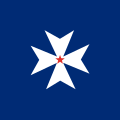This article needs additional citations for verification .(April 2023) |

Micronations are ephemeral, self-proclaimed entities that claim to be independent sovereign states, but which are not acknowledged as such by any recognised sovereign state, or by any supranational organisation. The constant reiteration of the flag as a symbol of a something that exists by the entity that it symbolizes confirms the validity of the flag as an officially sanctioned and/or definitive symbol of an entity; therefore, there has been a close association between vexillology/vexillogic imagination in creating visual symbols that appear to legitimize micronational claims. [1]
Contents
This article documents the designated national flags of micronations whose existence is verifiable in multiple, non-trivial third party reference sources, which have been cited in the linked encyclopedia articles for those entities.














































































